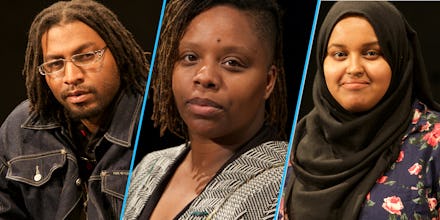With 'Power,' Black Lives Matter's Patrisse Cullors takes protest to the stage in Seattle

By now, many people are used to seeing street protests and social media hashtags about police violence in black communities. But that's not enough to change hearts and minds and bring about the needed change.
Few people understand that better than Black Lives Matter co-founder Patrisse Cullors, who, on Thursday, will debut the third installment of Power: From the Mouths of the Occupied. Power is a stage production that centers on the real stories of African-Americans in Washington state, who say they have been targeted by law enforcement and were denied their rights.
Running at the Langston Hughes Performing Arts Institute in Seattle through Saturday, Power highlights the experiences of nine multigenerational local residents, along with spoken word performances and visual media.
"The piece is really about amplifying the idea that, wherever black people are, criminalization exists," Cullors said in a phone interview. "You can go to any city and ask black people what their relationship is with local police and they will give you stories that point to over-policing, over-incarceration and punitive judgment."
Cullors' national production has been staged in Los Angeles, where a breakdown in community trust with law enforcement resulted in violent civil unrest decades ago, and in Kalamazoo, Michigan, where community tensions with police have made national news.
Seattle is ripe for such a production, given that its police force previously was under investigation by the U.S. Department of Justice over abusive practices. In 2012, the Seattle Police Department agreed to enter a court-enforceable consent decree to be monitored, after the Justice Department investigation found that officers routinely used excessive force against subjects. Of the uses of force the federal officials deemed unnecessary, over 50% involved minorities, according to the DOJ's report.
In September 2015, Attorney General Loretta Lynch praised SPD for its reform efforts. "Thanks to the consent decree and the commitment to change it represented, the Seattle Police Department has adopted policies and instituted trainings to address bias, curtail the use of force and implement new mechanisms of accountability," Lynch said in a press conference.
However, at the time, one of SPD's court-appointed monitors said police leaders had not adequately reviewed policies over non-lethal uses of force, including stun guns, pepper spray and batons, the Seattle Times reported.
In the Seattle iteration of Power, examples of police violence run the gamut, Cullors said. For one cast member, who asked that she be identified as "KT," the school-to-prison pipeline led to her incarceration at age 13.
"I'm telling my story to let people know how easy it is for a child to be misunderstood, pushed out and pushed into the criminal justice system," the 52-year-old KT said in a phone interview.
She survived sexual assault and rape as early as elementary school, although she said none of her attackers were held accountable. She became angry and began "acting out," leading to a cycle that found her in and out of Washington state correctional facilities for more than 20 years.
"I didn't get any opportunities to grow, or get my education, or get any trade to be productive — it really corrupted my life," KT said. Now she is a youth counselor and activist fighting to end the prison-industrial complex, and KT wants people to see her as a story of triumph.
Cullors said the vignettes in Power are being performed in between video montages of black people in other cities telling stories about state-sanctioned violence. The show will also feature an audio recording of We Charge Genocide, the 1951 petition to the United Nations over U.S. oppression of blacks.
Even with such heavy material, the show doesn't need professional actors, Cullors said.
"You can't deny someone of their story," she said. "You can't take that away from them."